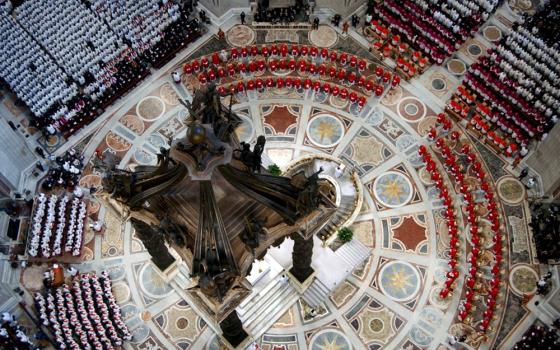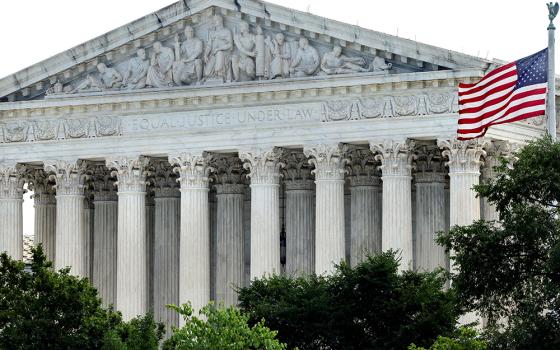In all the hullabaloo over Pope Francis’ press conference on the plane yesterday, it is easy to forget that the enduring message of Pope Francis’ first foreign trip had to do not with the Church’s stance towards gays, nor how to reform the Vatican bank. The enduring message had two parts, closely intertwined: The Church must allow herself to be renewed, and the principal path for that renewal is cultivating a culture of encounter, especially with the poor and the marginalized.
It may be wrong to call the World Youth Day celebrations Pope Francis’ first foreign trip. Actually, his election and immediate move into the Vatican may have been his first foreign trip and the escape to Rio should more properly be understood as his homecoming. Even though he is not from Brazil, Pope Francis is a bishop from the global South, a bishop of CELAM, a bishop who sees the world through a different lens because of his roots in Latin America. I can’t stress this enough, and it is why I wish the pope had not made his remarkable comments about gays yesterday: For the prior week, his commitment to the poor has been on full display, but it was consigned to page A6 or A8. But, mention any of the hot button issues and there it was, this morning, front page above the fold: “Who am I to judge?” Sadly, in America, there is a slice of the Catholic Left and a slice of the Catholic Right that would rather obsess about issues of pelvic theology and ignore this pontiff’s repeated calls to think about the millions of fellow souls who go to bed hungry every night. And the media? Well, let us recall that no network has ever launched a television show entitled, “Lifestyles of the Poor and Forgotten.”
The most memorable part of the trip was not the Mass before three million souls along the beach in Copacabana, although that was memorable. No, the part of the trip that really captured the imagination was the visit to the favela. A few weeks ago, I ran a piece about beautiful churches, and from an architectural point of view, there was not much to admire about the little chapel Francis visited. Yet, who can deny its beauty when seen with the eyes of faith. Set amidst the shacks made of corrugated steel and tar paper and wood remnants, the little chapel was a beacon of hope in a world of misery. The little chapel was Christ crucified again, the beauty of divine love overcoming the cruelty of the world. And there, in the middle of it, looking not one little bit out of place, was Pope Francis. As he walked to the entrance and as he left, he embraced clusters of children like a grandpa. He walked to a little hut of a home and went inside to allow the poor family that lived there to offer him a cup of coffee, demonstrating for all the falseness of pride which looks at the poor as people to be helped without recognizing their own capacity to give. This pope who constantly urges the Church, clergy and laity alike, to go out to the margins, to the periphery, here he was walking the walk, demonstrating how it is done.
The pope’s many talks were all wonderful in their way, and their way is far more simple and accessible than the talks of his predecessor. I was a fan of the density of Pope Benedict’s thought, but I recognize that such density also entailed a certain inaccessibility for most Catholics. Pope Francis tends to boil down his sermons into two or three points, and to make them with great clarity and simplicity. But, I suspect the two speeches that will most effect the reforms Pope Francis has promised were his speeches to the Brazilian bishops and then to the leaders of CELAM. These texts will be read by bishops’ conferences around the world. These texts should become the frame within which nuncios select candidates for the episcopacy and by which the Congregation for Bishops evaluated the nominees it gets.
In his address to the Brazilian bishops, the pope spoke about the lessons of Aparecida, retelling the tale of the discovery of the statue of the black Madonna by fishermen. He said:
There is much we can learn from the approach of the fishermen. About a Church which makes room for God’s mystery; a Church which harbours that mystery in such a way that it can entice people, attract them. Only the beauty of God can attract. God’s way is through enticement, allure. God lets himself be brought home. He awakens in us a desire to keep him and his life in our homes, in our hearts. He reawakens in us a desire to call our neighbours in order to make known his beauty. Mission is born precisely from this divine allure, by this amazement born of encounter. We speak about mission, about a missionary Church. I think of those fishermen calling their neighbours to see the mystery of the Virgin. Without the simplicity of their approach, our mission is doomed to failure.
Here is a question for every bishop, every priest, every religious, every lay person: Do I make present the attractiveness of the Gospel? Or do I reduce the Gospel to a checklist of ethical conformity? Do I preach, in word and deed, the Gospel in its radical simplicity or do I encrust it with ideological blinders drawn from the ambient, secular culture? There are those on the left and the right who need to ask themselves these questions. And, there is a further question, specifically for academic theologians: Is it not time to stop trying to deconstruct the mystery and undertake theology that will help the Church encounter the mystery? The Holy Father points the way forward: “Without the grammar of simplicity, the Church loses the very conditions which make it possible ‘to fish’ for God in the deep waters of his Mystery.” The phrase “grammar of simplicity” is exceedingly fecund, a phrase theologians can gnaw on.
There were other profound points in the pope’s address. He offered a trenchant critique of globalization of the kind for which he is rightly becoming famous and which, also rightly, should cause our friends at the Acton Institute to break into a cold sweat:
A relentless process of globalization, an often uncontrolled process of urbanization, have promised great things. Many people have been captivated by the potential of globalization, which of course does contain positive elements. But many also completely overlook its darker side: the loss of a sense of life’s meaning, personal dissolution, a loss of the experience of belonging to any “nest” whatsoever, subtle but relentless violence, the inner fragmentation and breakup of families, loneliness and abandonment, divisions, and the inability to love, to forgive, to understand, the inner poison which makes life a hell, the need for affection because of feelings of inadequacy and unhappiness, the failed attempt to find an answer in drugs, alcohol, and sex, which only become further prisons.
In the face of these threats to humanity, all of which the pope roots in globalization, Francis discerns an opportunity, not to give into the temptation to despair, but an opportunity to “see the big picture” as he puts it, and to renew the Church’s capacity to evangelize:
Few people are still capable of hearing the voice of pain; the best we can do is to anaesthetize it.
Today, we need a Church capable of walking at people’s side, of doing more than simply listening to them; a Church which accompanies them on their journey; a Church able to make sense of the “night” contained in the flight of so many of our brothers and sisters from Jerusalem; a Church which realizes that the reasons why people leave also contain reasons why they can eventually return. But we need to know how to interpret, with courage, the larger picture.
I would like all of us to ask ourselves today: are we still a Church capable of warming hearts?
Are we indeed? When was the last time a sermon warmed your heart? When was the last time a corporal work of mercy allowed you to get out of your own preoccupations and be blessed by encountering the poor? When was the last time you stopped yourself before blaming others, and instead looked to yourself and the vocation you have received in baptism? These are not easy questions, but they are easier to hear when they are brought to us from someone like Pope Francis who is so obviously cheerful himself. It is easier to follow – and, yes, discipleship is always about following – when a leader like Francis instills not only hope but courage.
In the Washington Post this morning, a theologian is quoted as saying, “I think there’s a palpable sense that people want to see the church succeed…I think there is this palpable sense that Pope Francis might be that agent of renewal that enables people to say, ‘It’s cool to be Catholic.’” I don’t know about cool. I have always been decidedly uncool. But, I do think the Pope is enabling us all, or at least inviting us, to encounter the Mystery and to rebuild the Church in such a way that all of her efforts are focused on this: Encounter the Mystery, especially in the poor and the marginalized, and everything else will take care of itself. It is the essence of the grammar of simplicity. It is the essence of our faith. Listening to the Holy Father, one has the sense that we are on the road to Emmaus again and, for the first time in a long time, may be headed back to Jerusalem in hope rather than away from her in fear.
Tomorrow: The speech to CELAM.






